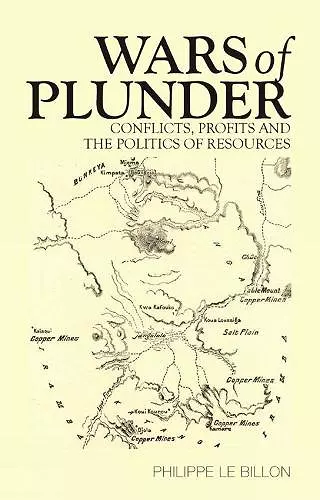Wars of Plunder
Conflicts, Profits and the Politics of Resources
Format:Paperback
Publisher:C Hurst & Co Publishers Ltd
Published:1st Apr '12
Currently unavailable, and unfortunately no date known when it will be back

From Angola and Liberia to Iraq and the Congo, wars have taken place in resource rich countries full of poor people. In Wars of Plunder Philippe Le Billon explores how resources have shaped recent conflicts, and what the international community has tried to do about it. Focusing on key resources-oil, diamonds, and timber-he argues that resources and wars are linked in three main ways. First, resource revenues finance belligerents, a trend that has become all the more conspicuous since the withdrawal of Cold War foreign sponsorship in the late 1980s. Although the 'War on Terror' has redefined military assistance and the internationalisation of war, many belligerents continue to rely on and profit from 'conflict resources'. Second, resource exploitation generates conflict. As global demand for raw materials has sharply increased, competition over critical resources such as oil has resulted in a flurry of 'resource conflicts', from local community struggles against mining multinationals to regional and international tensions. Third, economic shocks and poor governance sharply increase the risk of war (the 'resource curse'). While today's resource boom is a major economic opportunity for resource rich but poor countries, reliance on resource exports often implies sharp economic downturns. Not all resources are the same, however, and effective responses are at hand. Sanctions, military interventions and wealth sharing have helped bring an end to conflicts, yet only deeper domestic and international reforms in resource governance can stop the plunder.
'The bottom line is that Wars of Plunder represents a near-exhaustive study of the relationship between resources and conflict. In light of its command of a vast literature and its wealth of descriptive details it should be given a prominent place on the bookshelf of any researcher in related fields and should be the first book read by any new student of the field.' * H-War, H-Net reviews *
'Le Billon's uncovering of the complexities involved in resource conflict makes this book a valuable contribution to the discussion of intrastate violence ... Highly recommended.' * Choice *
'This impressive book will be a very significant contribution to its field. It does a remarkable job of summarizing a multifarious, and often complex, body of literature without oversimplifying it ... and reveals a prodigious amount of reading by the author as well as the breadth of field research he has pursued over many years.' * Dr Ricardo Soares de Oliveira, Oxford University *
'For anyone interested in war economies and what to do about them, this book is a real 'must-read'. From Angola to Cambodia, from oil to timber, the author draws on two decades of scholarly research and field experience to paint a remarkable picture of the complex resource-conflict nexus: concise, and yet nuanced and comprehensive.' * Gilles Carbonnier, professor of development economics at the Graduate Institute / Geneva and editor-in-chief of International Development Policy *
'Le Billon has written a deep, nuanced, analytically rich exploration of the many ways that oil, diamonds, and timber are intertwined with violent conflict. This is an important book for both scholars and activists.' * Michael L. Ross, Professor of Political Science at the University of California, Los Angeles, and author of The Oil Curse: How Petroleum Shapes the Development of Nations *
'The complexity of contemporary resource wars is elegantly unpacked in this lucid investigation of geography and violence. It shows how resources are entangled in complicated geopolitical economies which require careful policy initiatives rather than simple moral certainties. This simply is the "must read" volume for anyone concerned to understand these issues in depth.' * Simon Dalby, Carleton University *
ISBN: 9781849041454
Dimensions: unknown
Weight: unknown
288 pages